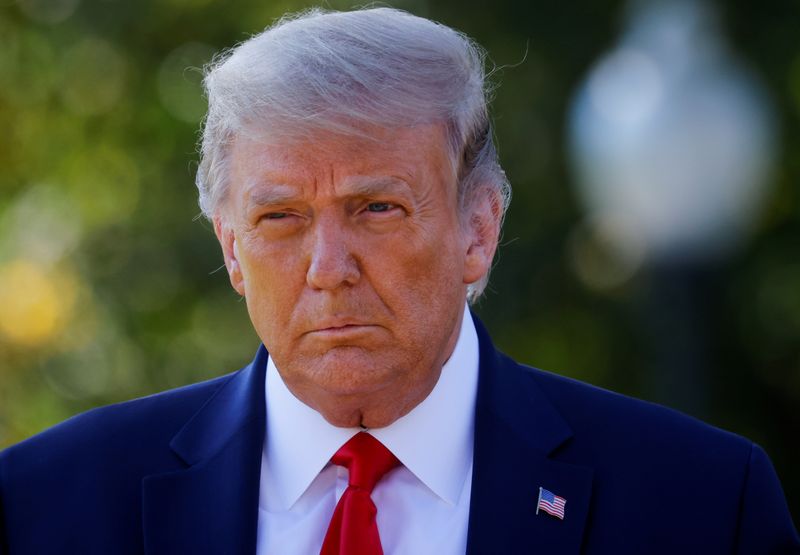 © Reuters. U.S. President Trump departs on campaign travel to Minnesota at the White House in Washington
© Reuters. U.S. President Trump departs on campaign travel to Minnesota at the White House in WashingtonBy Michael Martina and Andy Sullivan
(Reuters) – U.S. Democrats and nonpartisan election experts on Wednesday denounced President Donald Trump’s calls for his supporters to act as ad-hoc poll watchers in the November election, saying they were an oblique call for illegal voter intimidation.
While U.S. election conduct is governed by a patchwork of state and federal laws, they generally apply strict rules of conduct to partisan election monitors, who are not supposed to interfere in the electoral process.
During Tuesday night’s first debate https://www.reuters.com/article/idUSL1N2GQ0NQ with Democratic challenger Joe Biden, Republican Trump urged supporters to “go into the polls and watch very carefully,” arguing as he has done repeatedly without evidence that the election would be marred by widespread fraud.
“I am urging my people – I hope it’s going to be a fair election – if it’s a fair election I am 100% on board. But if I see tens of thousands of ballots being manipulated I can’t go along with it,” Trump said.
Democrats accused Trump of trying to scare voters.
“Voter intimidation is illegal in Nevada. Believe me when I say it: You do it, and you will be prosecuted,” Nevada Attorney General Aaron Ford said on Twitter.
“He is intimidating people,” House Speaker Nancy Pelosi said on MSNBC.
Rules vary by state as to how poll watchers must operate, but Democrats and Republicans both have said they expect to have record levels of volunteers on Nov. 3.
Some 40 states require partisan election monitors to be formally accredited ahead of the election, and many limit the number who can be at a particular location.
“Most states allow for parties and candidates to have some degree of measured poll watching,” said David Becker, director of the Center for Election Innovation and Research. “We need to also have functional polling places where voters feel safe.”
The national Republican party for more than three decades was limited by federal courts from mounting national voter monitoring operations after instances of voter intimidation. That ban was lifted in 2018.
In the battleground state of Pennsylvania, the Trump campaign is trying to overturn a state law that requires partisan observers to be registered voters in the county.
Philadelphia officials on Tuesday prohibited a self-identified Trump election monitor from entering a voting facility because she was not approved to be there.
“People are simply not allowed to stand around here and intimidate people,” Mayor Jim Kenney told the Philadelphia Inquirer newspaper on Wednesday.
Democrats have expressed concerns that some right-wing groups with firearms could try to gather near polling places, particularly in close districts or areas with high minority populations, as a way to suppress Democratic turnout. Democrats have hired voter protection https://www.reuters.com/article/idUSKCN24O184 directors in 19 states and thousands of volunteers and lawyers will be mobilized on Election Day.
Asked about potential voter intimidation by Republicans, Scott Hagerstrom, Trump’s 2016 Michigan campaign director and now a political consultant said: “I think that’s ridiculous” and “I just don’t see it happening.” He also dismissed Trump’s claims that there would be widespread voter fraud.
‘FEAR MONGERING’
Last week, Democrats accused Trump supporters of voter intimidation after they held a rally outside a voting center in Fairfax County, Virginia.
Virginia Attorney General Mark Herring later issued a reminder about state and federal laws prohibiting voter intimidation, including violent threats with firearms, private individuals attempting to usurp the role of law enforcement, harassment or noisy conduct intended to disturb the election.
Other state attorneys general have done the same.
Michigan Attorney General Dana Nessel pledged through a spokesman to prevent intimidation at the polls.
“The Attorney General’s office will work closely with local law enforcement and state partners to ensure a full and fair election in November, and one that is not influenced by fear-mongering and intimidation of voters or poll workers,” Press Secretary Ryan Jarvi told Reuters.
Demand for early and mail voting is surging this year as Americans look for a way to cast their ballots without increasing their risk of catching COVID-19. More than a month before the election, nearly 1.6 million Americans have already voted, according to the U.S. Elections Project at the University of Florida.
Nina Jankowicz, a fellow at the Wilson Center in Washington who has worked as an election observer in Eastern Europe said if remarks like Trump’s were made in another country, they would be cause for international concern.
“These sorts of national-level calls for people to show up are a recipe, frankly, for intimidation and violence,” she said.
The Republican National Committee has said its poll watchers will be trained and abide by state laws.




0 Comments:
Post a Comment